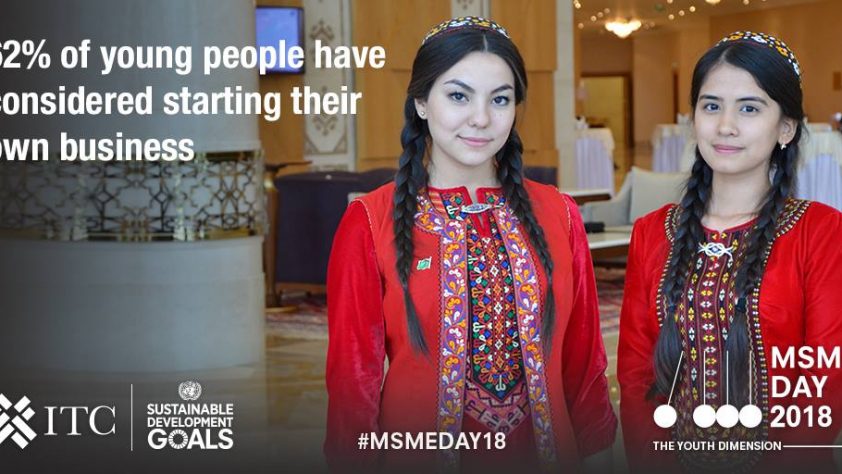
27 JUNE – MSME Day
A great source of employment
Last year on 27 June we celebrated for the first time the Micro-, Small and Medium-sized Enterprises Day. Those enterprises, which generally employ fewer than 250 persons, are the backbone of most economies worldwide and play a key role in developing countries. Those enterprises, which generally employ fewer than 250 persons, are the backbone of most economies worldwide and play a key role in developing countries.
According to the data provided by the International Council for Small Business (ICSB), formal and informal Micro-, Small and Medium-sized Enterprises (MSMEs) make up over 90% of all firms and account on average for 60-70% of total employment and 50% of GDP.
The General Assembly, recognizing the importance of these enterprises, decided to declare 27 June the Micro-, Small and Medium-sized Enterprises Day to raise public awareness of their contribution to sustainable development.
Micro-, small and medium enterprises, the first responders to societal needs
These types of enterprises are responsible for significant employment and income generation opportunities across the world and have been identified as a major driver of poverty alleviation and development.
MSMEs tend to employ a larger share of the vulnerable sectors of the workforce, such as women, youth, and people from poorer households. MSMEs can even sometimes be the only source of employment in rural areas. As such, MSMEs as a group are the main income provider for the income distribution at the “base of the pyramid”.
MSMEs should be the first responders to societal needs and provide the safety net for inclusiveness.
Access to finance
Although MSMEs generate the most new jobs, they face many challenges in day-to-day operations and to grow. Access to finance is often cited as one of the primary obstacles that affect MSMEs disproportionately. According to the World Bank, there are 200 to 245 million formal and informal enterprises that do not have a loan or overdraft, but are in need of one, or do have a loan but still find access to finance as a constraint. More than 90 percent are MSMEs.
Financing constraints are also magnified for informal firms, which tend to be small in size, and although often less productive than formal enterprises, contribute significantly to economic activity and employment. Informal firms are estimated to account for around 74 percent of all MSMEs in the world, and around 77 percent of all MSMEs in developing countries. Unregistered firms rely mostly on informal financing, which — although important in facilitating access to finance — is associated with lower firm growth and increased firm illegality.
A developed financial sector helps mobilize and allocate resources, and manage risks, contributing to private sector development. Finance helps economic growth, and in turn, job creation.
With this challenge, an opportunity arises for both policy makers and the private sector to intervene at various levels to try to encourage the formalization, participation and growth of micro-, small and medium-sized enterprises in international, regional and national markets, including through access for all to capacity-building and financial services, such as affordable microfinance and credit.
How they contribute to the achievement of the Sustainable Development Goals
Micro-, small and medium sized enterprises are vital in achieving the Sustainable Development Goals, in particular in promoting innovation, creativity and decent work for all.
Efforts to enhance access to finance for SMEs across key sectors of national economies are an important element of implementation of the Sustainable Development Goals (SDGs). SDG targets 8.3 and 9.3 call for enhancing the access of SMEs to financial services. In addition, SMEs are an important element in the implementation of SDG 8 (decent work and economic growth) and SDG 9 (industry, innovation and infrastructure).
Celebration of the Day
The General Assembly invites all Member States, organizations of the United Nations system and other international and regional organizations, as well as civil society, including non-governmental organizations, academia, individuals and other relevant stakeholders, to observe the Day in an appropriate manner and in accordance with national priorities, in order to raise public awareness of their contribution to sustainable development;
It also invites Member States to facilitate the observance of the Day by fostering research presentations, policy discussions, practitioner workshops and business owner testimonials from around the world.
Source: United Nations
http://www.un.org/en/events/smallbusinessday/
Related Post
Micro and small businesses can act...
In an international context where conflicts have reached their highest level since the Second World War, what role can micro, small, and med...
Celebrating Women Entrepreneurs: Key Insights from...
According to the GEM 2024/2025 Global Report entitled Entrepreneurship Reality Check, far too many women entrepreneurs are still seen by nat...
SME Digitalisation to manage shocks and...
Although uptake of digital practices by SMEs continues to increase, so too has the “digital gap” with larger firms. Understanding the dr...




